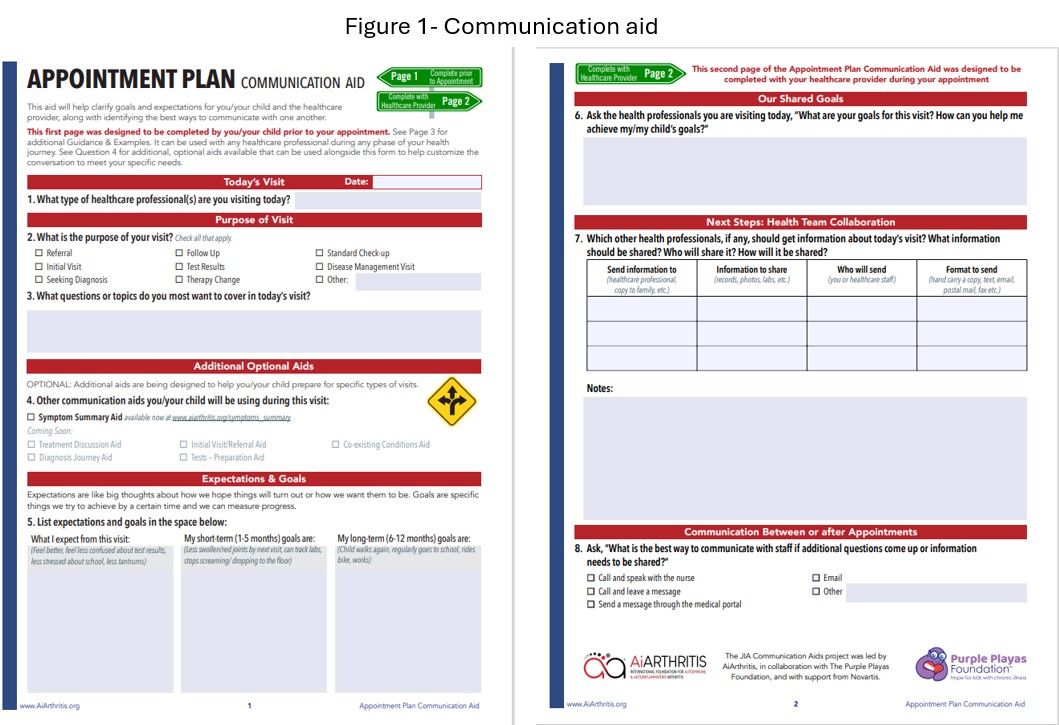Session Information
Session Type: Poster Session A
Session Time: 10:30AM-12:30PM
Background/Purpose: Juvenile idiopathic arthritis (JIA) is a childhood onset autoimmune disease requiring long-term care and personalized treatment. Through a rigorous series of mixed patient and provider workgroups, AiArthritis developed communication aids to improve communication and decision making between JIA families and their providers. The aid clarifies the patient’s clinical questions, and their short- and long-term goals of care (Fig 1). We aimed to evaluate the feasibility and effectiveness of this communication aid in pediatric rheumatology clinics.
Methods: Following approval from the Washington University Institutional Review Board, this quality improvement (QI) study enrolled patients through the pediatric rheumatology clinic with JIA and suspected JIA of any age, with parental consent. The communication aid was provided at check-in for the patient (age ≥12) or the parent to complete. The provider reviewed the responses during the visit. Afterward, both the patient/parent and the provider team completed anonymous surveys. Primary outcome measures were set at ≥ 50% of patients finding the aid easy to use, helpful in communicating goals, and improving the quality of experience, and ≥75% of provider responses indicating an improved therapeutic alliance without adversely affecting clinic workflow. The first Plan-Do-Study-Act cycle enrolled 10 patients, and the second enrolled 20. The third cycle has ongoing enrollment.
Results: Of 31 patient/parent participants, 93% found the handout very easy to use. Majority of participants (64%) felt the aids greatly or somewhat helpful in preparing their appointment goals (Fig 2). Two-thirds reported an improved overall experience during their appointment, and 70% wanted the aid used in future visits. Among 56 provider responses, 50%, 30%, and 19% were from attending physicians, fellows, and nurses, respectively. The majority (93%) reported that the aid did not adversely affect workflow (Fig 3); none indicated a negative impact. Moreover, 79% of the providers felt the communication aid improved therapeutic relationship with patients, and 91% of the respondents supported the continued use of the communication aid in the clinic.
Conclusion: This QI study has met the primary outcome measures. We have found that the communication aid was feasible to use in outpatient clinic for patients with JIA or suspected JIA. It facilitates development of personalized treatment plans and should be considered for implementation more widely in the pediatric rheumatology clinic. Areas for improvement include providing communication aid in advance of the appointment. Limitations of the study are lack of long-term follow up to assess for durable communication improvement and progress towards reaching patient-made goals.Acknowledgement: AiArthritis (International Foundation for Autoimmune & Autoinflammatory Arthritis) for developing the JIA Health Journey Communication Aids and allowing us to use these aids for the study. AiArthritis would also like to acknowledge Purple Playas Foundation for their role in co-designing the aids.
To cite this abstract in AMA style:
Civilibal Tang N, Guess R, Hazan R, Monahan A, Kitcharoensakkul M. Implementation of a Communication Aid in Juvenile Idiopathic Arthritis Patient Visits, a Quality Improvement Study [abstract]. Arthritis Rheumatol. 2025; 77 (suppl 9). https://acrabstracts.org/abstract/implementation-of-a-communication-aid-in-juvenile-idiopathic-arthritis-patient-visits-a-quality-improvement-study/. Accessed .« Back to ACR Convergence 2025
ACR Meeting Abstracts - https://acrabstracts.org/abstract/implementation-of-a-communication-aid-in-juvenile-idiopathic-arthritis-patient-visits-a-quality-improvement-study/


.jpg)
.jpg)